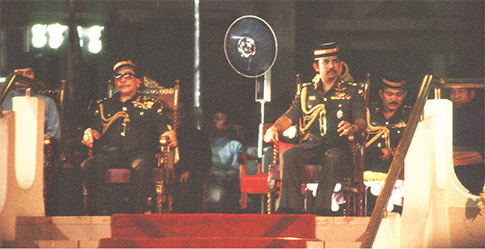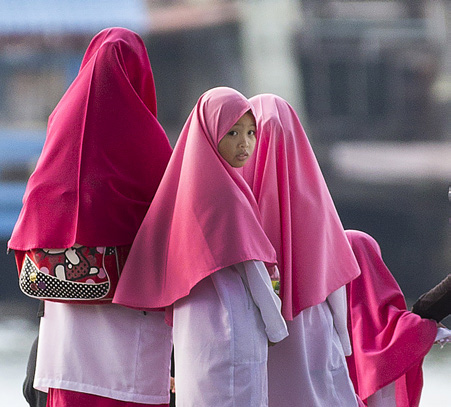History & Culture

Historical findings suggest the Brunei Kingdom began more than 1,500 years ago, referred to as Puni or Puli in ancient Chinese texts.
In the 14th Century the country’s first ruler Awang Alak Betatar embraced the Islamic faith and changed his name to Sultan Muhammad Shah. As a territory administered by a Muslim government, subsequent Brunei sovereigns became known as Sultans.
The country’s Golden Age commenced in the 16th Century, reaching eminence when Brunei’s power was recognised throughout Borneo, the Sulu Archipelago and the Southern Philippines. However, by the 19th Century, the Brunei Empire began to decline due to conflicts and the colonial expansion of European powers. In 1888, Brunei became a British protected state and two years later, Brunei was reduced to its present size. The country was divided into two enclaves, with Temburong separated from Brunei-Muara, Tutong and Belait districts.
In 1906, the Residential System was established in Brunei. Under this system, a British Resident was appointed to advise the Sultan on all matters except Malay customs, traditions and Islamic religion.
Following the aftermath of the World War II, Brunei gradually began to recover and made a major breakthrough during the reign of Sultan Sir Muda Omar ‘Ali Saifuddien Sa’adul Khairi Waddien which coincided with the country’s first commercial discovery of oil in 1929. As the oil and gas industry grew, Brunei underwent a massive economic growth and transformed into a thriving, modern state. The Residential System was then abolished in 1959.
In 1967, His Majesty Sultan Haji Hassanal Bolkiah Mu’izzaddin Waddaulah ibni Al- Marhum Sultan Haji Omar ‘Ali Saifuddien Sa’adul Khairi Waddien, Sultan and Yang Di-Pertuan of Brunei Darussalam was proclaimed as the Sultan of Brunei. The following year, His Majesty was crowned as the 29th Sultan, leading Brunei to even greater development.
Brunei and Great Britain signed an amended and revised version of the 1959 Agreement in 1971, giving Brunei full internal independence except defence and external affairs. In 1979, the Treaty of Friendship and Cooperation was signed, paving the way for Brunei’s full independence in five years’ time.
In 1984, Brunei gained independence and attained self-government from the British. His Majesty declared Brunei as a fully independent sovereign nation ready to resume its international responsibilities.
A Timeless Symbol of Brunei's Heritage and Faith
Discover the 500-year history of Kampong Ayer
Traditions & Custom

Brunei Darussalam’s culture is deeply intertwined with the Islamic faith, reflected in the country’s architecture, ceremonies and everyday life etiquette. While Bruneians are generally understanding towards visitors, learning their culture and tradition will go a long way in making a positive impression as you mingle with the locals.
In terms of traditional attire, baju cara melayu and baju kurung are worn by Malay men and women respectively. They are typically worn during special occasions such as weddings, religious events and Hari Raya Aidilfitri, often in vibrant colours.
The baju cara melayu consists of a longsleeve shirt and long trousers, paired with an intricately designed sinjang around the waist and a black headgear called songkok. Meanwhile, the baju kurung consists of a long-sleeve blouse and long skirt, often worn with a headscarf. The younger generation tends to opt for a more modern cut and design, while preserving the traditional elements and cultural heritage.
During Ramadhan, the ninth month of the Islamic calendar, Muslims fast from sunrise to sunset. It is also a time for families to gather and break fast together, strengthening family bonds.
Hari Raya, celebrated after Ramadhan ends, is considered an opportunity for family and friends to reconnect and forgive each other. Bruneians traditionally engage in a salam (handshake) in accordance to the Malay culture to ask for forgiveness. The salam is usually initiated by the younger of the two by bending down until their forehead comes in contact with the other person’s hand as a sign of respect. Alternatively, the younger may bend down and kiss the elderly’s hand.
Showing respect for the elderly is a trait deeply embedded in Brunei culture, shown in everyday etiquette such as bending slightly when walking past an elderly person. Handshakes are usually initiated by the younger person and is practiced between individuals of the same gender. Some may opt not to shake hands with members of the opposite gender.
Another thing to note is Bruneians traditionally eat with their hands, particularly with the right hand as the left is considered unhygienic. But eating with hands is more commonly practiced at home, as cutlery is provided at restaurants and eateries. Pointing at objects with the index finger is also considered impolite, especially when pointing at people. It is common practice for Bruneians to point with their thumb, while the four fingers are folded in a way that resembles a fist.
To conclude, Bruneians are a tightly knit conservative community with strong family values, known for their warm and friendly nature towards visitors from all walks of life.
